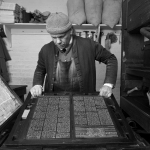Today, we know there are more than 200 viruses that cause the common cold. But in the 1700s, sudden changes in temperature were thought to be the reason people got sick. When it was cold outside, you would try to keep from “catching cold” by walking quickly. That’s not the only difference between 18th century and 21st century views on prevention and treatment. Wait until you hear what supposedly cured symptoms such as runny nose, sore throat, and fever!It’s that time of year when it seems everyone is sniffling, coughing, and feeling all-around “yucky.” I battled a particularly vicious cold early this season and it seemed to linger forever. Each morning, I would unpack my arsenal of throat lozenges, cold medicine, and cough syrup—until one day I got to thinking there had to be some all-natural alternatives to help alleviate my misery. Lucky for me, my office is just down the street from the Apothecary, which I discovered is full of age-old remedies.
In 1776, the shop would have served as both your doctor’s office and your pharmacy and you wouldn’t have waited for hours to get your prescriptions filled. Most of what the Apothecary needed to treat your ailments was imported and all right there—in various jars, drawers, and vials. I asked how doctors would have specifically treated the cold, known as a “catarrh” in the 18th century. My ears perked up when I heard suggestions like licorice and hot chocolate but then I inwardly cringed at some of the other mentions. Scroll down for a complete list of those 18th-century recommendations.
TREATING COLD SYMPTOMS IN THE 18TH CENTURY
Fever: Peruvian Bark and Willow Bark were used to treat fevers. There were experiments taking place in the 18th century using thermometers to test a possible correlation between temperature and fever. But most doctors checked for an elevated pulse and warm skin to make their diagnosis.
Cough: Licorice (made into lozenges) and hot chocolate (made with spices) were both used as cough suppressants. Garlic syrup was also used as an expectorant to help break up “phlegms of the chest.” Today, we know garlic has a bonus benefit in that it acts as a weak antibiotic.
Hoarseness: Syrup of Marshmallow Roots was the way to go if all that coughing made your voice raspy. Also called “Althea,” the root is still used in modern medicines to help treat coughs.
Sore Throat: Honey, lemon, and sugar candy (equal parts) were mixed together and eaten to soothe the pain of a sore throat.
Runny Nose: Lozenges of Sulfur were prescribed to help get your sniffles under control.
Upset Stomach: Mint was mashed with sugar into a paste and was used as a way to treat nausea.
There’s also evidence that elderberry was used to treat colds and modern science shows evidence that this botanical has some anti-viral properties.
In addition to these prescriptions, the doctor would also try to regulate the patient’s activities. It’s a regimen physicians still recommend to this day! Resting, staying in a warm bed, and eating foods that are easily digestible. The best suggestion? Chicken soup! It turns out, chicken soup has been the go-to remedy from as far back as the 12th century.
**The apothecary studies 18th-century medicine and always encourages guests to discuss all of their medicines (including supplements) with their pharmacist before self-treatment.
How do you treat your cold symptoms? Any family secrets passed down from generation to generation? Share them here.



Such an interesting subject. My mom always gave us the real ginger ale when we were sick with the stomach flu. It was the only thing appetizing to drink. For headaches, I rub a eucalyptus balm on my temples. It helps immensely. I’d love to live in Colonial times but I have to say I’d only go back if I could bring my antibiotics and Tylenol with me!
Joanie says
Whenever I was sick as a kid my mom would make me hot jello to drink. Apparently her mother did the same thing for her when she was a kid and was sick. Needless to say, to this day I can’t stand jello! Lol
Clove oil, cinnamon oil, lemon oil, grapefruit oil, oregano oil. I love to use essential oils to help with our family’s ailments. A bit of research on natural cures paired with some common sense makes all the difference. I was raised by a father who is now a retired physician, and even he is beginning to see the benefits of essential oils.
Add Tea Tree oil!
We were drinking strong ginger beer around Christmas to help with a bad cold. The ginger helps with wheezy chests and is good for settling a queasy tummy.
Some of these are relevant today. Aspirin was made with Willow Bark at one time. Honey tea and lea are still good fora sore throat, Garlic and onion have definite antibiotic properties and Chicken soup never fails, but no one knows why
Being American Indian, there was one remedy my grandmother used on me around 20 years old. I came to visit and had an earache. I flew with an airline and couldn’t fly with a bad ear. She told me it would work..I just had to do it. Urine on a piece of cotton and place the cotton in my ear. I hate to tell you I did it, but it worked. Unsure why and I’m sure drs will laugh, but it was my grandmother and I did what she told me. Btw, she said…let the first bacteria of your urine go first before you wet the cotton. .
Very interesting, Debbie. I can’t say I’d be so brave as to try it but I’m certainly glad it worked for you!
We use many of these natural remedies, and my Grandpapa also would rub my feet with Apple Cider vinegar to help pull a fever out of my head. I can also remember one time when I was about 6, when he placed baked potatoes wrapped in flour sack towels and lined the sides of my body with them, on top of the blankets so as to not burn me. He was born just before 1900, and learned all of his healing from his mother…who in turn learned it from hers…and that would be in the 18th century, I believe. Knowing that this knowledge comes down to me through them, makes it all the more special, and gives me a deeper sense of connection to them.
Emryss - my oma used to do a lot of those same things! My mom knows them a little better than I do but now I want to pick up the phone and call to talk to her about them. Thank you so much for sharing!
That’s wonderful Melodie! Other than the elderberry syrup, is there a particular remedy you’ve tried that’s worked?
We use a lot of essential oils and various herb blends for teas and tinctures as needed. The elderberry syrup we make is a blend sweetened with honey and lemon already in it. Mint, specifically peppermint is awesome for upset stomachs and headaches. Just chewing on it can help with digestion and freshen breath too.
We use many of these in our home. We make our own elderberry syrup and have found it to be very effective. .